Pātaka Ora welcomes everyone
20 June 2024
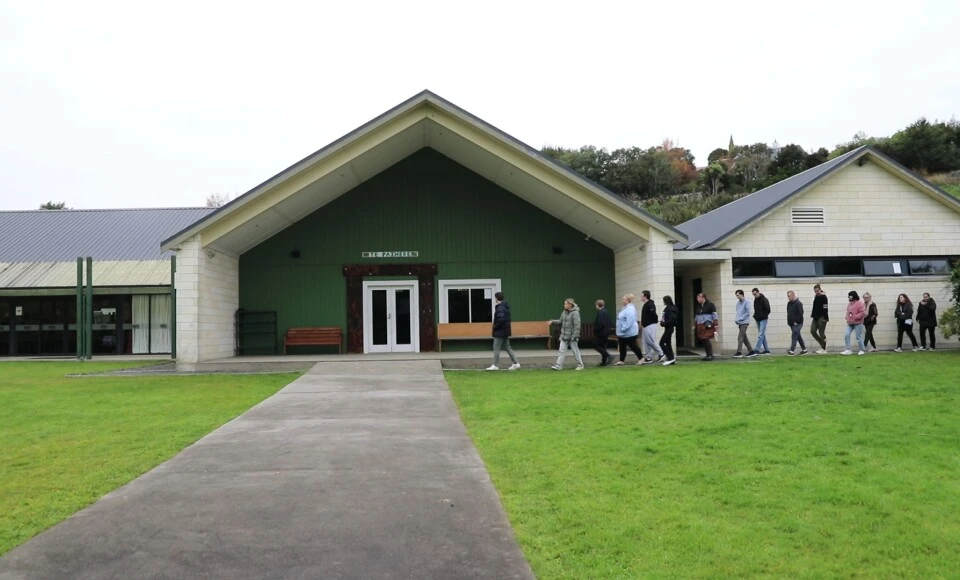
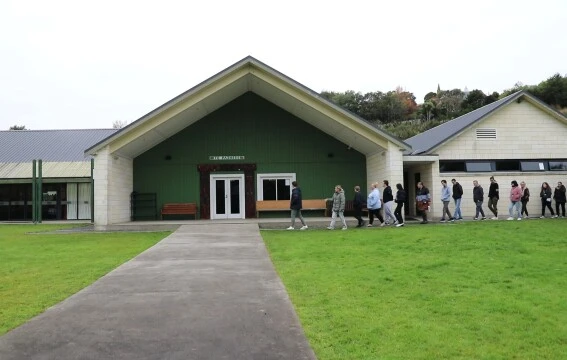
In a quiet suburban street, in the heart of Ōtepoti | Dunedin, lies a marae that every week opens its doors and its heart to the community.
Araiteuru Marae, was gifted by Kai Tahu to all iwi from the four winds who live in the region. It is a place for anyone to meet others from many cultures and it has been home to a weekly event, Pātaka Ora, for the past few years.
Every Monday, marae whānau and community members cook together in the kitchen and serve up a free meal for all who want to attend. Music, conversation and a lot of aroha accompany the food.
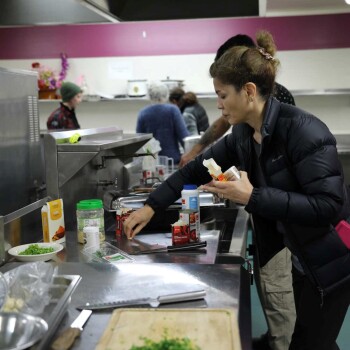
Najibeh and Shakoor cooking meals with other volunteers in the kitchen at Araiteuru Marae
Pātaka Ora is a great platform for community connection in Ōtepoti | Dunedin. Former refugees who have settled in the area actively participate in Pātaka Ora every week.
Shakoor Barakzai and Najibeh Rahimi, a couple originally from Afghanistan, often attend Pātaka Ora, helping to prepare kai. They cook Khorak, a popular Persian dish with hamburgers and rice. The couple say that they love to attend, and to meet other community members “who are kind and helpful”.
New Zealand Red Cross Pathways to Settlement Manager in Ōtepoti | Dunedin, Kelly Campbell (Te Arawa), says the initial connection between the Marae and new New Zealanders who have refugee backgrounds, began with regular Pōwhiri to welcome newcomers to the area.
Strengthened connections
Today, the connection between Māori and those who have come to New Zealand from all over the world is strengthened over kai.
“Many former refugees we work with are from the Middle East. They are very strong in their culture and language, and whānau-oriented. They have embraced and welcomed the commonalities between the communities,” Kelly says.
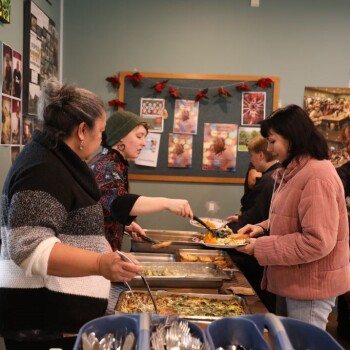
Serving up the Pātaka Ora meal
“It’s a human need to have, and share, a sense of belonging, and for some new New Zealanders, it takes time to make connections.
“The Marae is a safe space for them, and while learning tikanga is not the focus, they learn as they go and embrace that.”
For Alaa Sukkar, a Settlement Lead for New Zealand Red Cross, not being alone is an important gift Pātaka Ora and Araiteuru Marae provide to the community.
“For me, as someone who came from Syria, and I know it is the same for other people from the Middle East, this is how our Grandma's house looks like. Whenever we visit Grandma, there is people going all together to the kitchen to prepare food, prepare dessert, have some games and stuff. So, it's that feeling of warmth in the space.”
The benefits of Pātaka Ora have been shared more widely as well, Kelly says. Other social organisations and their members in the city attend, volunteer and provide support.
“Anywhere between 30 to 100 people turn up each week,” she says.
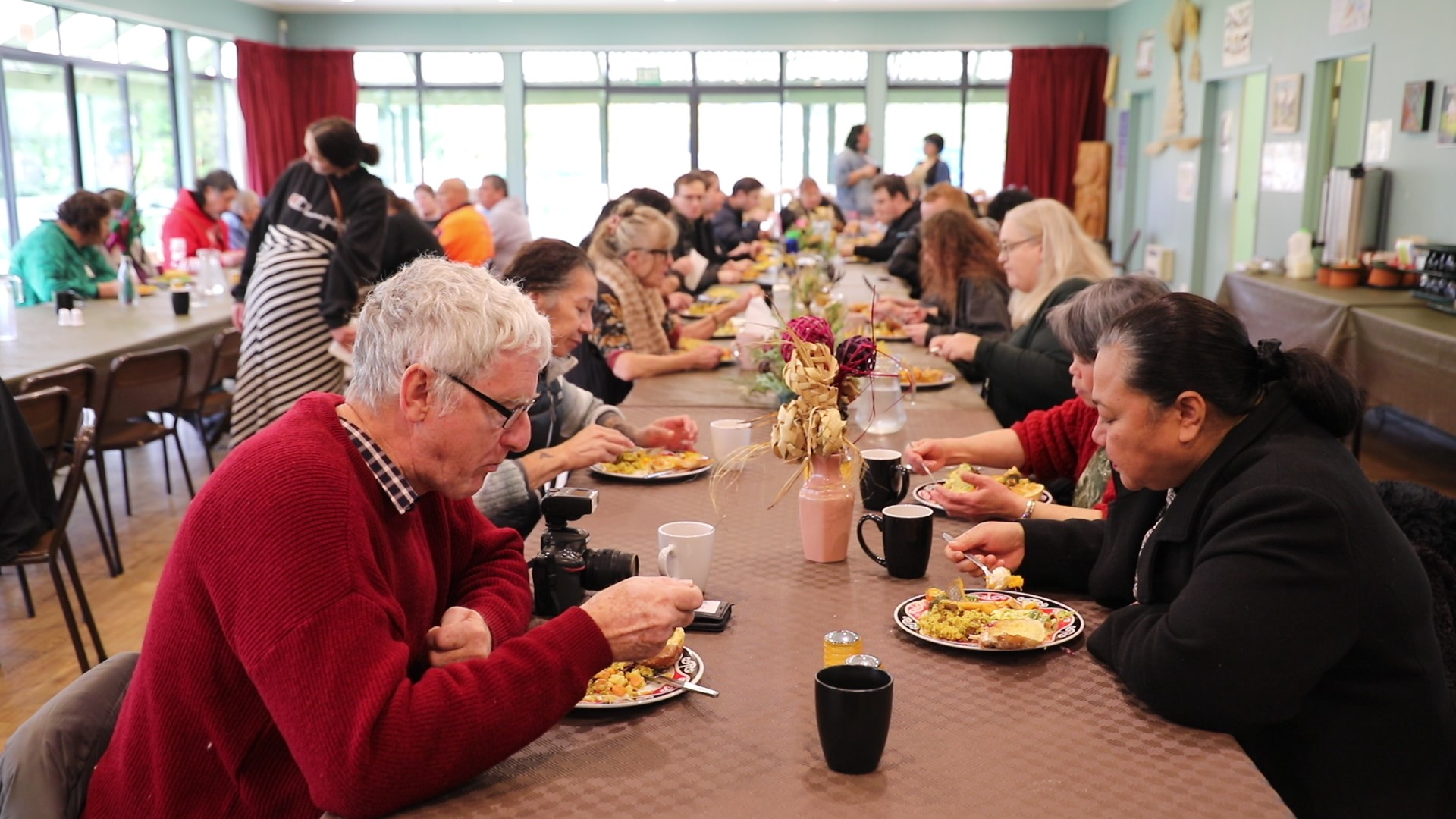
Weekly event Pātaka Ora at Araiteuru Marae
Tania Sharee Williams (Ngāpuhi), Rangatira of Araiteuru Marae, says it’s about life enhancement.
“Whether that is through a smile being shared, a word that's been shared, you're learning something new, or it's just that your puku is being filled by the food that is there, that's available for you to take home to share with other people. We just hope that your life can be enhanced.
“We have a lot of different sectors of our community coming together to feed into this space and we just feel really honoured that we're able to hold it in a te Ao Māori space, which is here on Araiteuru Marae. It's really important about weaving people into te Ao Māori and using this, Pātaka Ora, as a vehicle to connect people into our world.”
Watch this short video prepared during Pātaka Ora at Araiteuru Marae
The video starts with text and background music.
Text: Pātaka Ora at Araiteuru Marae brings the Ōtepoti Dunedin community together every week.
Visual: People entering into Marae.
Text: People from all walks of life prepare food and eat together.
Visuals: close shot with only a hand visible, seasoning a salad then cooking a meal. Shifts to a wide shot of two females putting a tray in the oven.
Voice, a person, Alaa Sukkar, Settlement Lead, Pathways to Settlement, Dunedin, talking to camera: I'm originally a former refugee from Damascus, Syria. I arrived in New Zealand in late 2017 and Dunedin became my home.
Visuals: people preparing meals and chatting with each other with Alaa's continued voice in the background.
Voice: the main idea of the Kaupapa was to create a collective space, where people can come have the spirit of the community and support each other. It created a really big aspect for our community and our former refugees who are settling in the city. It is very familiar for them. They feel it's home.
Visuals: people are setting up meals at the serving table.
Voice with a person, Najibeh Rahimi, talking to the camera and visual of two people cooking a meal: Pātaka Ora is a very good place, a very free place and wth kind people. Free for me - happiness. Kind people come and speak to each other.
Visual: People sitting in a large dining setup with tables in two long rows, with voice in the background.
Voice with a person, Tania Williams, Rangatira, Araiteuru Marae, talking to the camera: We have a lot of different sectors of our community coming together to feed in this space and we just feel really honoured that we're able to hold it in a te Ao Maori space, which is here on Araiteuru Marae.
Visuals: meals being served with a voice in the background.
Voice, Kelly Campbell, New Zealand Red Cross Pathways to Settlement Manager, Dunedin: We came wanting to bring people together and to create a safe space. A place where there's a sense of belonging and community, life enhancement for ourselves, but also for other people as well. People from all different walks of life just being able to come together.
Voice, Shakoor Barakzai, talking to camera and visuals with people serving meal: I come to Pātaka Ora. I cook the rice.
I cook Khurak. I cook Hamburgers. I love every person, they are very good.
Visuals: long shot of people sitting on the dining table, eating and chatting to each other with a voice in the background.
Voice, English and Te Reo, Tania Williams in the background: It's also, for me, really important about weaving people into te Ao Maori and using this Pātaka Ora as a vehicle to connect people into our world. Everyone is welcome here. Nō reira, nāu te rourou, raura, nāku te rourou ka ora ai te iwi e, with your basket and with my basket, we're all going to thrive.
Visuals: people serving meals, eating and chatting to each other.
Voice, Kelly Campbell: It's a really awesome thing to be part of. It has changed our relationship with families, where they sort of see us not just as the person supporting them at the Red Cross, but they see us as community members as well and part of their wider community. So it's just a real plus for everyone, really.
Visuals: people clapping and singing.
The video ends with New Zealand Red Cross logo on the screen.
How we support former refugees
We support former refugees through our settlement service for up to two years. Pathways to Settlement supports former refugees in New Zealand when they begin their settlement journey. Pathways to Employment helps people from refugee backgrounds to work and supports employers to increase diversity in their organisations.
We provide settlement services in eight locations across the country: Invercargill, Dunedin, Blenheim, Nelson, Wellington, Masterton, Levin and Palmerston North and employment services in all eight of these locations plus, Timaru, Ashburton, Christchurch, Hamilton and Auckland.
In the last 12 months, we supported 771 former refugees from 24 different countries settling in eight locations. Currently, 69 of them are building their lives in Ōtepoti | Dunedin.
We assisted over 1,000 former refugees towards gaining employment. Of these, 538 have gained work or gone into full-time study, 480 have gained paid employment and 170 full time employment. We supported 58 former refugees in Ōtepoti | Dunedin on their employment journeys.
Our teams include Community Champions from former refugee communities and staff skilled in supporting vulnerable migrants and former refugees to find meaningful employment.
We started providing our employment services support to Ukrainians last year with 92 people joining our Pathways to Employment – Ukraine programme, and 34 have gained employment.
Learn more about Refugee settlement
How you can help
There are plenty of ways you can get involved with former refugees in your community.
- Our settlement work is supported by 700 volunteers who welcome former refugees when they arrive in their new location, assist them and connect them to local community services at the start of their settlement journey. Our volunteers are extraordinary community helpers who welcome new Kiwis.
Become a refugee support volunteer
- Our teams work with refugee-background job seekers who have a vast range of skills, qualifications, and employment histories.
Give a former refugee a job opportunity
- Business partnerships are critical to our work helping people in New Zealand and overseas. Explore different ways your business can support our work and make an impact.
Header image: Araiteuru Marae, gifted by Ngai Tahu, and people entering for Pātaka Ora.
